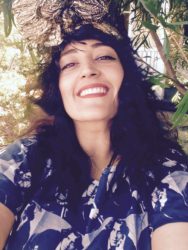Alex Skovron
Alex Skovron was born in Poland, lived briefly in Israel, and came to Australia aged nine. He is the author of five poetry collections, most recently Autographs (prose-poems, 2008), as well as a prose novella, The Poet (2005). Awards for his poetry include the Wesley Michel Wright Prize, the John Shaw Neilson Award, the Australian Book Review Poetry Prize, and for his first book, The Rearrangement (1988), the Anne Elder and Mary Gilmore awards. His novella was joint winner of the FAW Christina Stead Award for fiction. He lives in Melbourne and works as a freelance editor. His New & Selected Poems is in preparation.
Citadel
Then one night the books ganged up on him. He was seated at his table in the studio-den, composing a cheque for the recent fence-repair, when an odd rapping, like muffled drummery behind his chair, a kind of tapping, caused him to cock his shoulder. The books were floating off the shelves to the floor, in random order; hundreds had already sorted themselves in steep spires. As he swivelled, stunned, watching the stacks grow higher, the bookcases empty, each steepening tower like a tottering sentry began to flow, a twitching perpendicular river, converging on his patch in the middle. There was no time to unravel the riddle – he was aghast, then horrified, distinctly, for the piles were merging. Some books had their heavy gilded spines towards him thickly, some their grinning edges – surging, swirling backbones bluntly fisted (convex or squared, many jacketed), or concave ledges viciously snapping, swaying as they listed; thousands of covers chaotically flapping, yet no chunk of any teetering creature (each mystically bracketed) likely to collapse. Cowering now, subsiding to the Persian rug, he saw the twisters lapse to a terminal dance, each obelisk in its terrible advance gave a kind of shrug, appeared to shudder forth and back, clearly readying for the final attack. Desperate by now that it must be a dream, he squeezed his eyes shut, breathed deep, then took a chance. Look! Bookcases crammed again, and quiet – no more savage parade! But flickering on the floor, its pages splayed, a single book.
.jpg)
 Maria Takolander’s poetry has been widely published. Her first book of poems, Ghostly Subjects (Salt 2009), was shortlisted for a Queensland Premier’s Literary Award in 2010. She was also winner of the inaugural Australian Book Review Short Story Prize in 2010, and has recently been awarded an Australia Council grant to develop a book of short stories, which will be published by Text. She is a Senior Lecturer in Literary Studies and Creative Writing at Deakin University in Geelong.
Maria Takolander’s poetry has been widely published. Her first book of poems, Ghostly Subjects (Salt 2009), was shortlisted for a Queensland Premier’s Literary Award in 2010. She was also winner of the inaugural Australian Book Review Short Story Prize in 2010, and has recently been awarded an Australia Council grant to develop a book of short stories, which will be published by Text. She is a Senior Lecturer in Literary Studies and Creative Writing at Deakin University in Geelong. Kate Waterhouse is co-editor of Motherlode: Australian Women’s Poetry 1986–2008 (Puncher & Wattmann, 2009). Until 2010, she lived in Sydney with her husband and three young daughters. She is currently living in Auckland, working on her accent and two poetry collections—one set in Australia and one in New Zealand, and on a second editing collaboration with Jennifer Harrison.
Kate Waterhouse is co-editor of Motherlode: Australian Women’s Poetry 1986–2008 (Puncher & Wattmann, 2009). Until 2010, she lived in Sydney with her husband and three young daughters. She is currently living in Auckland, working on her accent and two poetry collections—one set in Australia and one in New Zealand, and on a second editing collaboration with Jennifer Harrison. Nicholas YB Wong is the author of Cities of Sameness (Desperanto, 2012). His poems are forthcoming in Drunken Boat, Gargoyle, J Journal: New Writing on Justice, The Journal, Mead, Nano Fiction, Platte Valley Review, The Portland Review, Quiddity and REAL: Regarding Arts & Letters. He reads poetry for Drunken Boat. Visit him at
Nicholas YB Wong is the author of Cities of Sameness (Desperanto, 2012). His poems are forthcoming in Drunken Boat, Gargoyle, J Journal: New Writing on Justice, The Journal, Mead, Nano Fiction, Platte Valley Review, The Portland Review, Quiddity and REAL: Regarding Arts & Letters. He reads poetry for Drunken Boat. Visit him at  Ivy Alvarez is the author of Mortal (Washington, DC: Red Morning Press, 2006). A recipient of writing residencies from MacDowell Colony (USA), Hawthornden Castle (UK), and Fundacion Valparaiso (Spain), her work is published in journals and anthologies in many countries and online, with individual poems translated into Russian, Spanish, Japanese, and Korean.
Ivy Alvarez is the author of Mortal (Washington, DC: Red Morning Press, 2006). A recipient of writing residencies from MacDowell Colony (USA), Hawthornden Castle (UK), and Fundacion Valparaiso (Spain), her work is published in journals and anthologies in many countries and online, with individual poems translated into Russian, Spanish, Japanese, and Korean. 
 Misbah Khokhar was born in Karachi-Pakistan, with both European and Indian ancestry. She currently lives in Melbourne. She holds a Masters in Philosophy in Creative Writing from the University of Queensland. Her work appears in Australian Poetry Journal, Cordite, Contemporary Asian Australian Poets and Peril. She has been featured on ABC Radio’s Poetica, and has performed at the Queensland Poetry Festival. She was highly commended by Thomas Shapcott, Brownyn Lea and John Kinsella, and mentioned as a ‘standout’ in Lea’s essay ‘Australian Poetry Now’ (Poetry Magazine, May 2016, Ed. Robert Adamson). Her debut collection Rooftops in Karachi is published with Vagabond deciBels3.
Misbah Khokhar was born in Karachi-Pakistan, with both European and Indian ancestry. She currently lives in Melbourne. She holds a Masters in Philosophy in Creative Writing from the University of Queensland. Her work appears in Australian Poetry Journal, Cordite, Contemporary Asian Australian Poets and Peril. She has been featured on ABC Radio’s Poetica, and has performed at the Queensland Poetry Festival. She was highly commended by Thomas Shapcott, Brownyn Lea and John Kinsella, and mentioned as a ‘standout’ in Lea’s essay ‘Australian Poetry Now’ (Poetry Magazine, May 2016, Ed. Robert Adamson). Her debut collection Rooftops in Karachi is published with Vagabond deciBels3.
 Brendan Ryan has had three collections of poetry published, the most recent being A Tight Circle, Whitmore Press, in 2008. His next collection of poetry, Travelling Through the Family, will be published by Hunter Publishers in 2012.
Brendan Ryan has had three collections of poetry published, the most recent being A Tight Circle, Whitmore Press, in 2008. His next collection of poetry, Travelling Through the Family, will be published by Hunter Publishers in 2012. Jen Crawford is a New Zealander living in Singapore. Her poetry collections include Bad Appendix (Titus Books), Napoleon Swings (Soapbox Press) and most recently, Pop Riveter, a set of factory poems available in limited edition from Pania Press. She teaches creative writing at Nanyang Technological University.
Jen Crawford is a New Zealander living in Singapore. Her poetry collections include Bad Appendix (Titus Books), Napoleon Swings (Soapbox Press) and most recently, Pop Riveter, a set of factory poems available in limited edition from Pania Press. She teaches creative writing at Nanyang Technological University. Julie Chevalier’s short-story collection, Permission to Lie, was published by Spineless Wonders in 2011. Two poetry collections are forthcoming from Puncher & Wattmann: linen tough as history, and Darger: his girls.
Julie Chevalier’s short-story collection, Permission to Lie, was published by Spineless Wonders in 2011. Two poetry collections are forthcoming from Puncher & Wattmann: linen tough as history, and Darger: his girls.